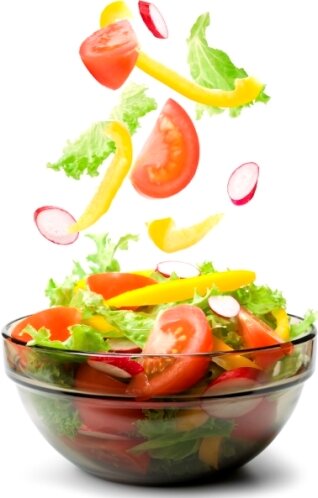Vegetable Nutrition
The human body is such a complex organism.
It takes food, sun, air and water in and absorbs, distils and converts what it needs and (mostly) discards the rest. It's not just a machine where you add petrol and it goes. Everything is a complex interaction.

While we are generally focused on vitamins and fat content in our diet there is less attention on minerals and trace elements.
We don't focus on them because we don't need large amounts of them. But they play an important role in maintaining the body's fluid balance, the structure of bones and teeth, the regulation of blood pressure, wound healing and the activity of muscles and nerves.
We can't make minerals so we have to obtain them from our diet.
Nine of the trace elements (iron, copper, zinc, manganese, selenium, iodine, chromium, fluoride and molybdenum) cause specific deficiency disorders and are considered essential dietary factors.
So it was a little alarming to read that the mineral content in commercially available vegetables has fallen approximately 40% since the 1930's. The study was prepared for the UK government which has been testing commercially available foods since the 30's and is available here.
Matthew Adams runs an organisation called Good Gardeners Association in the UK and he was the one that brought the study to my attention.
It raised questions with me. Not so much the what, but why? So I wrote to him and asked: "Why is the drop in nutrition so dramatic (are we guessing as the reasons?), what evidence is there that our health is worse (different yes, but due to many, many factors), and does it matter?
Don't misunderstand the question. If I need to eat 10 carrots a day rather than 6, it's a good bet I won't get that many into me, but will I be suffering malnutrition as a result?
Is your research showing a rise in nutrition based on organic growing methods?"
This was his response.
"Why is the drop in nutrition so dramatic? My thinking is as a society becoming disconnected from nature we use the earth's resources for our benefit i.e. fossil fuels, chemical fertilisers, etc and regard nature as something to be controlled. Yet the Gaia theory considers the world to be a self-sustaining living organism capable of self-regulation.
A miniature example of this would be us humans. We develop an illness, the immune system is set to work and an internal solution is found that can cure the body of its illness. The same can be seen on the larger scale. The planet is sick, as a result of human intervention, so it must kick in its immune system to rid itself of the illness.
That's a little philosophy to help guide what may be happening in the physical world.
The loss of nutrients. The research on our website is taken from data collected by the British Government who since the 1930's (when conventional agriculture really started to get a hold) analysed every 10 years the mineral content of veg, fruit, etc available to us as a nation.
In other words the food we buy and eat, which in the 1930's was more local based where as in the 1990's it was more global based. There are some critics of this research and I must say I have found a few problems myself, but putting it in context, it does point to a general decline in the nutritional quality of our food.
This is generally accepted and so we do not need to get bogged down in the nitty gritty numbers thing. A similar study as this was also carried out in America and very similar conclusions were found—a decline in mineral content.
What do both UK and USA have in common with regard their approach to food and the environment? They are primarily interested in making money and have welcomed with open arms conventional agriculture which not only uses chemical fertilisers, which damages life in the soil, but also chemical sprays designed to kill pests and diseases which also kills soil life followed by an annual turning upside down with the plough which further destroys soil structure and life.
I hope you can see that this way of thinking demonstrates the human centred approach to nature where it is simply a resource to be exploited. They are not thinking or are not capable of understanding how it is all connected. Both producer and consumer are interested in wealth! How much can I make? Or how much can I save from my food bill to spend on things like cars, houses, holidays abroad, etc.
What do UK and USA have in common with regard to health? They are entering into a period of a health meltdown, costing the state billions or earning the drug companies, etc billions.
In 1900 the burden of disease in the UK came largely from infectious diseases, such as TB, cholera, etc due in part to poor living conditions. As people gathered more personal income and improved their living conditions average age began to increase.
Today, the burden of disease comes from the chronic degenerative diseases where in 2004 it accounted for 83% of all deaths in the UK. Disease has shifted from something you catch to something you develop where each generation passes on poorer health to its offspring. This tends to correlate with the onset of modern farming and the loss of nutrients.
Degenerative diseases such as heart disease, cancer, osteoporosis along with poor mental health, infertility and anti-social behaviour were not common in the 1900's but are today. Is there a link to nutrition?
A study carried out in the 1940's by a Doctor Francis Pottenger showed that if cats were fed processed foods as opposed to raw, natural foods they would develop the degenerative diseases as described above.
The experiment lasted for 10 years covering four successive generations. For each successive generation the symptoms were shown to occur at an ever earlier age. By the 4th generation the cats fed processed foods were wiped out. They could no longer give birth to a viable population due to poor health from the food they were eating. The raw food diet cats were fine and healthy.
This does not confirm the loss of nutrients as being the cause but rather the effect of processing, which does affect nutritional status, killing of many micro-nutrients that you get in fresh food.
Going back to health, in the UK Obesity is effecting more than half the population and this leads to the onset of degenerative diseases. The worrying trend is that our children are now suffering more than ever.
A gloomy prediction by UK Health Select Committee recently suggested that if nothing is done we could see our children die before their parents! Just like the cat study! Childhood cancer is on the up and is now second biggest killer after accidents. Heart disease is being recorded as cause of death for some children.
Incidentally, the experiment found that it could reverse these effects by replacing the processed diet with the raw food diet, although the rate of recovery was not as quick as the rate of decline it did demonstrate the power of good nutrition in relation to health.
To summarise we have two factors relating to nutrition. One the loss of minerals (the building blocks of nutrition) and two the loss of freshness and vitality (perhaps a spiritual quality).
The research I have developed so far is considering both the above factors by working with nature which in this case means working with the life in our soil. I am tracking the flow of minerals from soil to plant via the soil ecology.
The garden is biodynamically managed which I consider to be of the highest quality food available to us, at present, because it seeks to positively enhance the spiritual qualities or life force of the food.
The garden has been separated into four plots to test the effect of no-dig, single dig, double dig and the fourth is a control. I am waiting for leek results to come back soon to give us two years of data.
I must be careful how I present the results because the study is ongoing. However, what I can say is that we are getting differences of 100% more mineral content in potatoes and 60% more in carrots and Leeks. Their composition is also different. For the food with lower mineral content in total it has the greatest potential for toxic overload. For example the carrots with the lowest mineral content showed the highest content for mercury whilst the carrots with the highest mineral content showed the lowest content for mercury.
It's food for thought quite literally. What you see on the outside is not necessarily what you get on the inside. I think very few people understand this, including many in the organic movement/industry but is this very surprising when the dominant philosophy ignores the subtleties and connections we have with nature?
Oh, by the way the answer is not to just eat more carrots to make up for lost nutrients for this may have loss of life force and potentially toxic mix of nutrients.
The answer is to grow better food hence 'Moving beyond organic' means guaranteeing nutritious food that looks after the planet's health and human health."
MORE articles on sustainable gardening & eco-friendly natural living.
